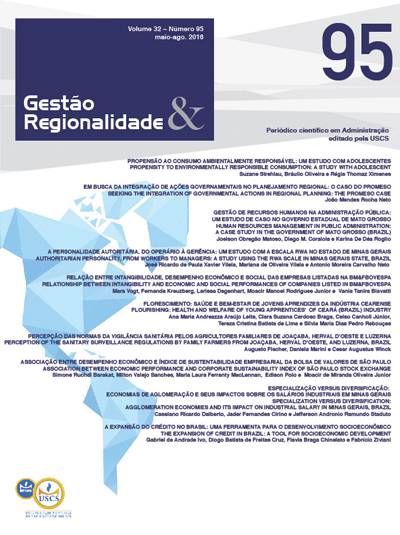Flourishing: health and welfare of young apprentices’ of Ceará (Brazil) industry
DOI:
https://doi.org/10.13037/gr.vol32n95.2884Abstract
In order to assess the flourishing level in the work of young apprentices of Ceará (Brazil) industry, a survey was administeredto 309 young people using the Flourishing Scale at Work (EFLOT, in the Portuguese acronym). The research is characterizedas descriptive and exploratory with a quantitative approach. The results indicate no significant difference in the level of flourishingin the matters of gender, schooling, and family income. However, there is a difference in the four distinct industrialsectors, especially a significantly lower average in the food and beverage one. It was concluded that the young apprenticesdo not have a full flourishing stage in relation to their first job.Downloads
Downloads
Published
2016-06-03
How to Cite
Leite, A. M. A. A., Braga, C. S. C., Canholi Júnior, C., Lima, T. C. B. de, & Rebouças, S. M. D. P. (2016). Flourishing: health and welfare of young apprentices’ of Ceará (Brazil) industry. Gestão & Regionalidade, 32(95). https://doi.org/10.13037/gr.vol32n95.2884
Issue
Section
Articles
License
Autores que publicam nesta revista concordam com os seguintes termos:
- Autores mantém os direitos autorais e concedem à revista o direito de primeira publicação, com o trabalho simultaneamente licenciado sob a https://creativecommons.org/
licenses/by-nc-nd/4.0/ , permitindo o compartilhamento do trabalho com reconhecimento da autoria do trabalho e publicação inicial nesta revista. - Autores têm autorização para assumir contratos adicionais separadamente, para distribuição não-exclusiva da versão do trabalho publicada nesta revista (ex.: publicar em repositório institucional ou como capítulo de livro), com reconhecimento de autoria e publicação inicial nesta revista.
- Autores têm permissão e são estimulados a publicar e distribuir seu trabalho online (ex.: em repositórios institucionais ou na sua página pessoal) a qualquer ponto antes ou durante o processo editorial, já que isso pode gerar alterações produtivas, bem como aumentar o impacto e a citação do trabalho publicado (Veja O Efeito do Acesso Livre).
























